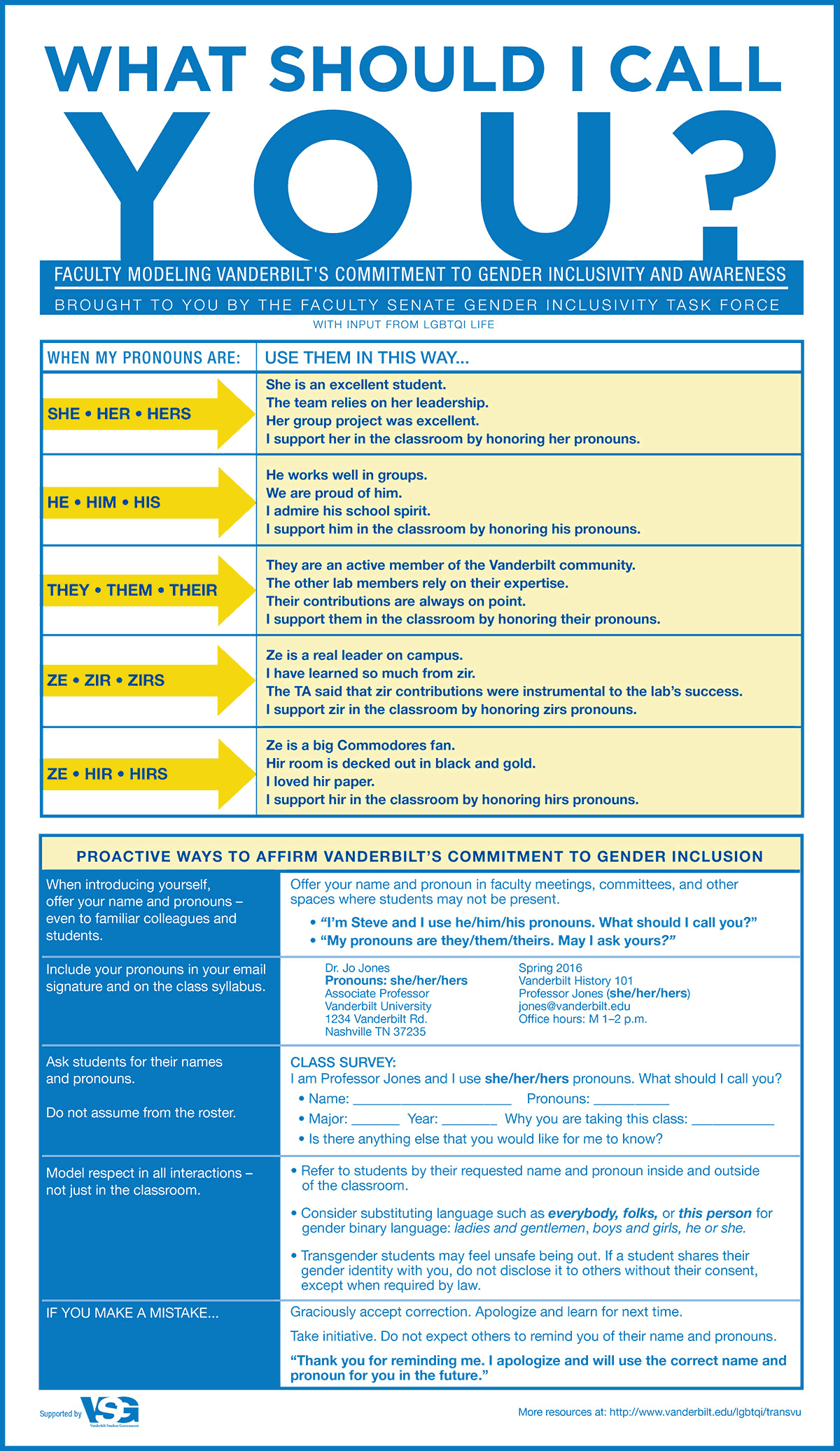Pronoun Guidance
Vanderbilt Faculty Senate, with support from Vanderbilt Student Government and trans/non-binary students on campus, worked to develop resources to give guidance on gender inclusivity in the classroom.
For general guidance on gender inclusivity, please see the Center for Teaching’s resource, “Teaching Beyond the Binary in the University Classroom.”
In addition, the Vanderbilt English Language Center created a pronoun guide as part of its mission to address the professional, academic, and practical language needs of students who have a first language other than English. The ELC hopes this guide will not only provide English-language learners the opportunity to better understand and participate in this campus initiative but will also help them make informed choices regarding their own pronoun usage.
Ways to Make Language More Inclusive
“Hello, everyone” or “How are y’all doing today?” in a group setting instead of “Hey, guys!” or “Hey ladies” or “How are you guys doing?”
“They are a first-year student” when referring to a student instead of “they are a freshman”.
If you are unaware of someone’s pronouns, you can use their name in place of any pronoun: “Jordan wasn’t feeling well, so Jordan went to student health for a checkup.”
Common Pronouns and Their Usage
This list is not inclusive of all possible preferred pronouns. This is a list of common pronouns and their usage in grammatical contexts.
| Subject | Object | Possessive | Possessive Pronoun | Reflexive |
| He | Him | His | His | Himself |
| “He laughed” | “I called him” | “His book” | “That is his” | “He loves himself” |
| She | Her | Her | Hers | Herself |
| “She laughed “ | “I called her” | “Her book” | “That is hers” | “She loves herself” |
| They | Them | Their | Theirs | Themselves |
| “They laughed “ | “I called them” | “Their book” | “That is theirs” | “They love themselves” |
| Ze (or Zie) | Hir | Hir | Hirs | Hirself |
| “Ze laughed ” (“zee”) |
“I called hir” (“heer”) |
“Hir book” | “That is hirs” | “Ze loves hirself” |
How to Ask About Pronouns
Asking “what pronouns do you use?” can provide an opportunity for someone to offer their gender pronouns for you to use. Other options include: “how would you like me to refer to you?” or “how would you like to be addressed?”
Another option is to begin by offering the pronouns you use. Try: “I use he, him, his pronouns. Do you mind if I ask what pronouns you’d like me to use when referring to you?”
What to Do If You Mistake Someone’s Pronouns
The best thing to do if you use the wrong pronoun for someone is to say something right away, such as “I’m sorry, I meant they.” If you realize your mistake after the situation, apologize in private and move on. You may want to go on about how bad you feel that you messed up or how hard it is for you to get it right, but you should refrain from doing so. It is inappropriate, creates a spectacle, and makes the person who was misgendered feel awkward and responsible for comforting you.
Why Pronouns Matter
Below is an additional resource developed by this group to give guidance on pronouns. LGBTQI Life has copies of this poster available if you would like to pick one up.
Please note that if a student, staff, or community member tells you that they do not want to disclose their pronouns or do not wish their pronouns to be public knowledge, you can continually refer to that person by their name only.
